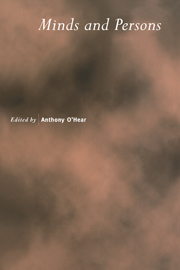Book contents
- Frontmatter
- Contents
- Preface
- Notes on Contributors
- Perceptual, Reflective and Affective Consciousness as Existence?
- The Domain of Folk Psychology
- Minds, Persons and the Unthinkable
- Moderately Massive Modularity
- A Theory of Phenomenal Concepts
- Free Will and the Burden of Proof
- Materialism and the First Person
- Language, Belief and Human Beings
- Human Minds
- Non-Personal Minds
- Personal Agency
- Mental Substances
- Mind and Illusion
- Index
Mental Substances
Published online by Cambridge University Press: 04 August 2010
- Frontmatter
- Contents
- Preface
- Notes on Contributors
- Perceptual, Reflective and Affective Consciousness as Existence?
- The Domain of Folk Psychology
- Minds, Persons and the Unthinkable
- Moderately Massive Modularity
- A Theory of Phenomenal Concepts
- Free Will and the Burden of Proof
- Materialism and the First Person
- Language, Belief and Human Beings
- Human Minds
- Non-Personal Minds
- Personal Agency
- Mental Substances
- Mind and Illusion
- Index
Summary
Do minds exist?
Philosophers of mind typically conduct their discussions in terms of mental events, mental processes, mental properties, mental states—but rarely in terms of minds themselves. Sometimes this neglect is explicitly acknowledged. Donald Davidson, for example, writes that ‘there are no such things as minds, but people have mental properties, which is to say that certain psychological predicates are true of them. These properties are constantly changing, and such changes are mental events’. Hilary Putnam agrees, though for somewhat different reasons:
The view I have long defended is that the mind is not a thing, talk of our minds is talk of world-involving capabilities that we have and activities that we engage in. As Dewey succinctly put it, ‘Mind is primarily a verb. It denotes all the ways in which we deal consciously and expressly with the situation in which we find ourselves. Unfortunately, an influential manner of thinking has changed modes of action into an underlying substance that performs the activities in question. It has treated mind as an independent entity which attends, purposes, cares and remembers'. But the traditional view, by treating mental states as states of the ‘underlying substance’, makes them properties of something ‘inside’, and, if one is a materialist philosopher, that means properties of our brains. So the next problem naturally seems to be: ‘Which neurological properties of our brains do these mental properties “reduce” to?’ For how could our brains have properties that aren't neurological? […]
- Type
- Chapter
- Information
- Minds and Persons , pp. 229 - 250Publisher: Cambridge University PressPrint publication year: 2003

